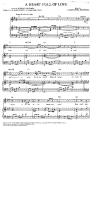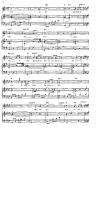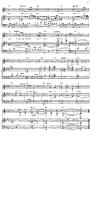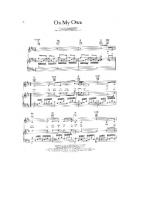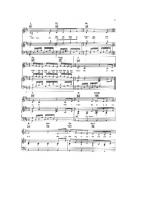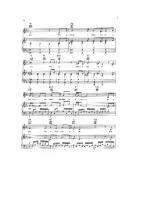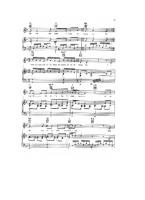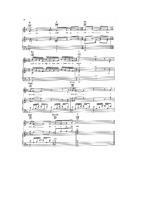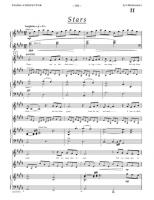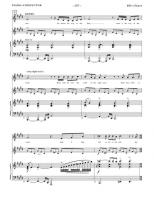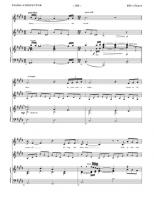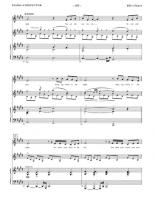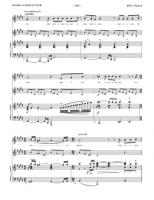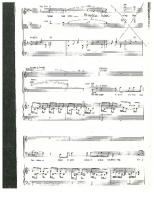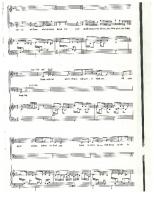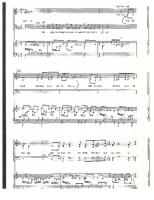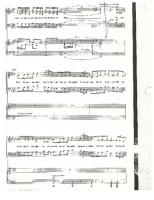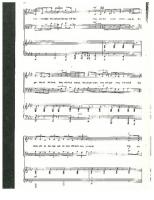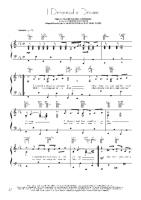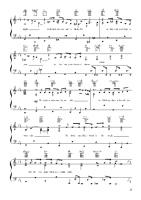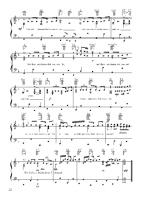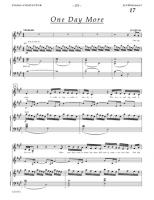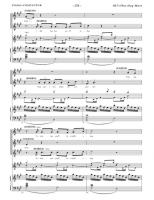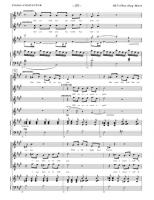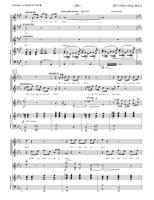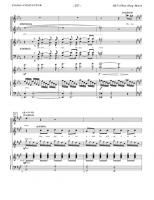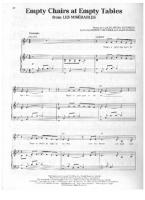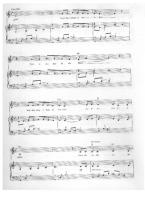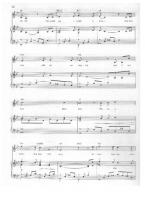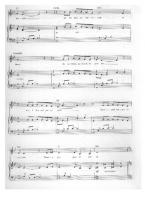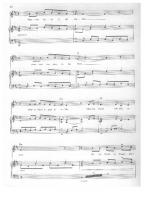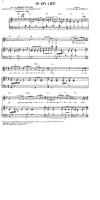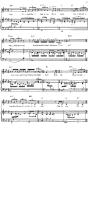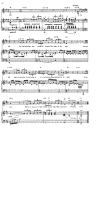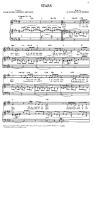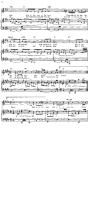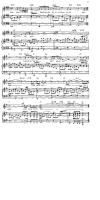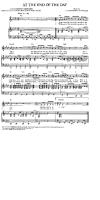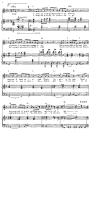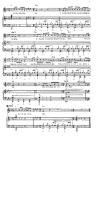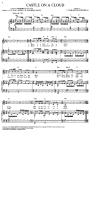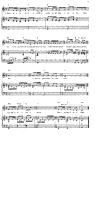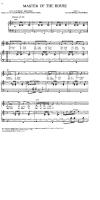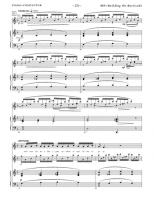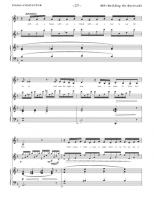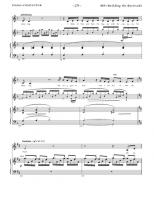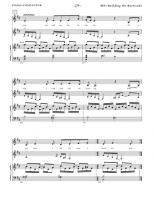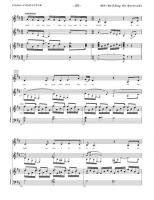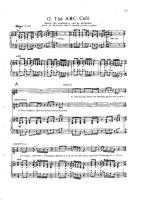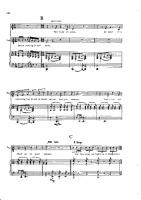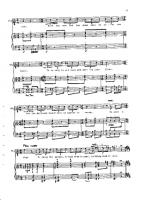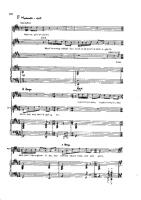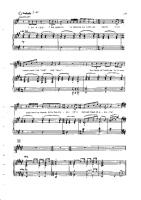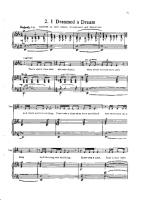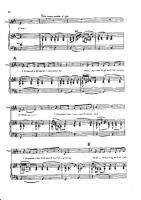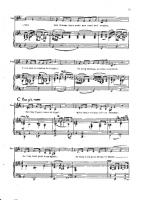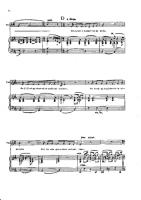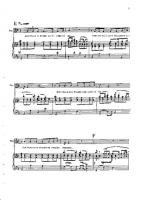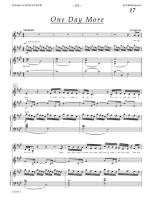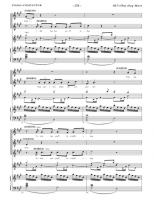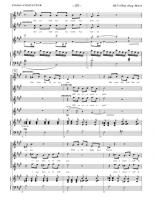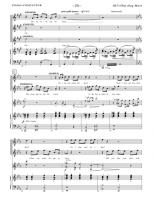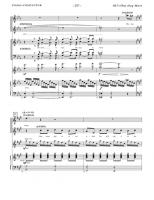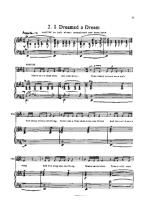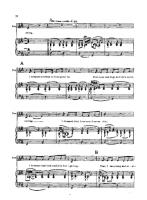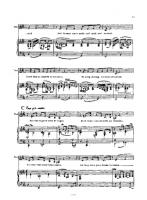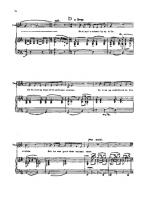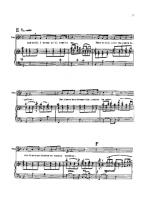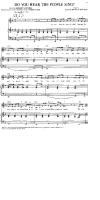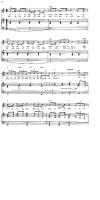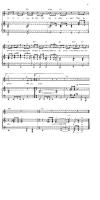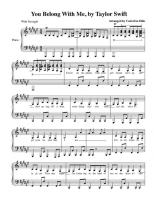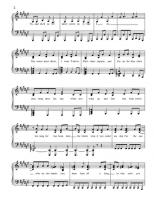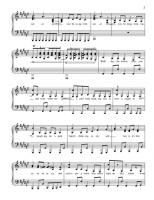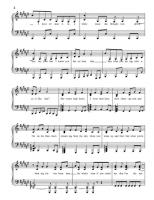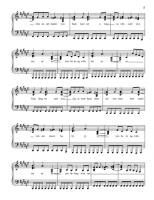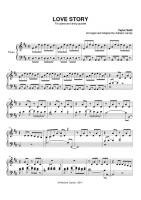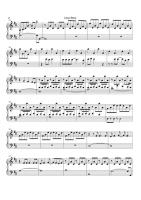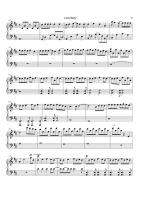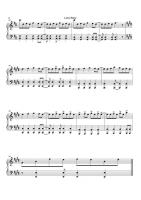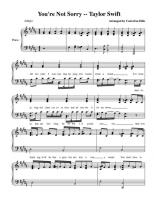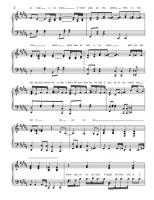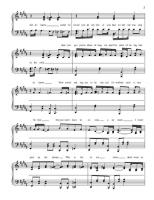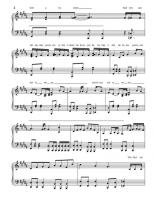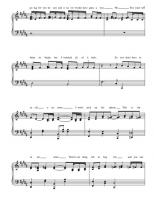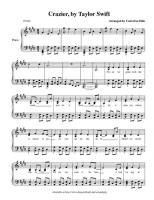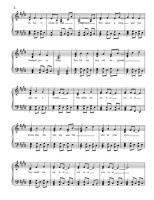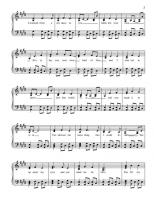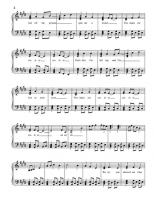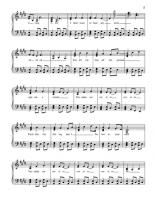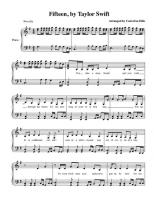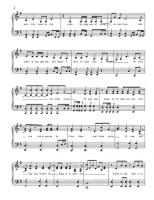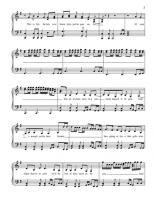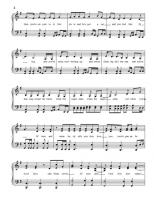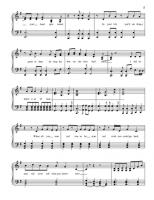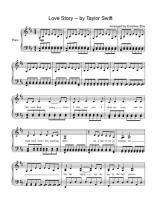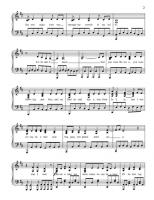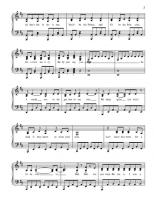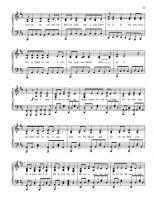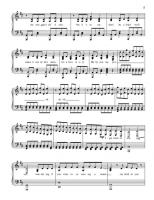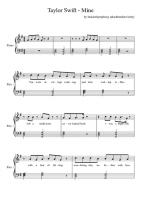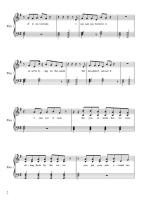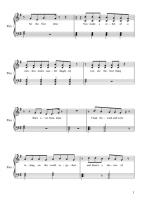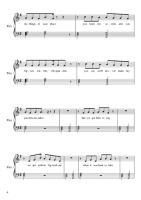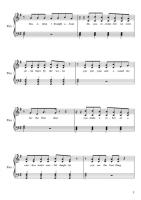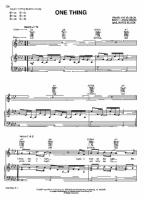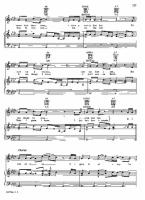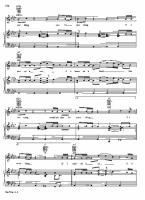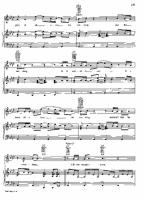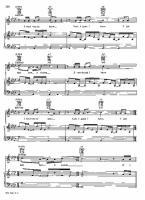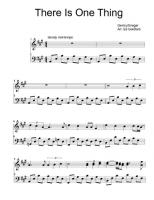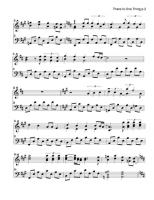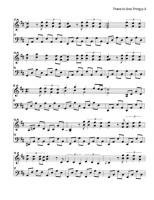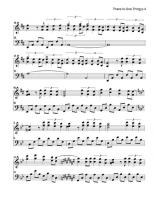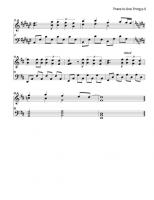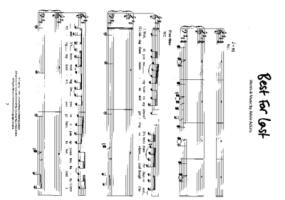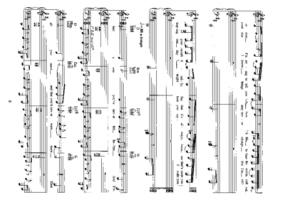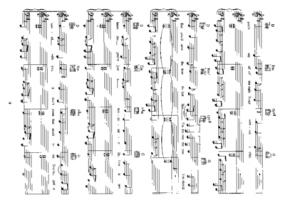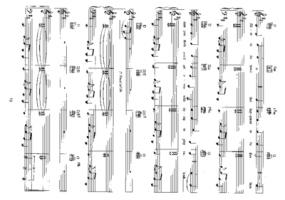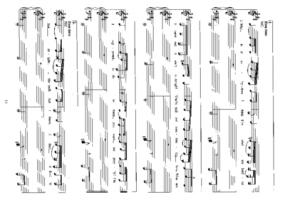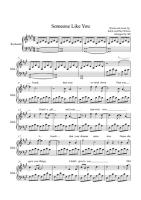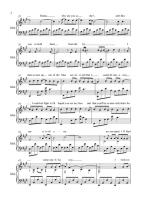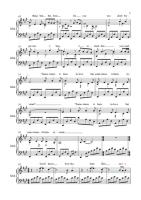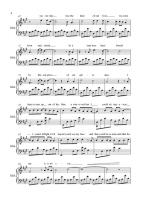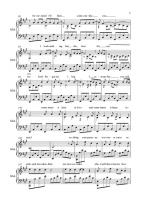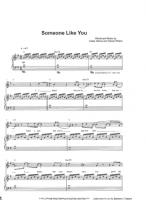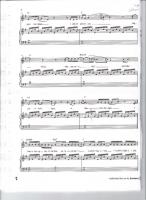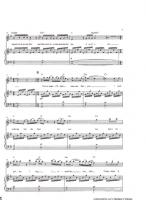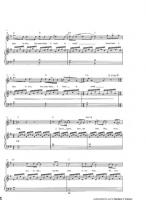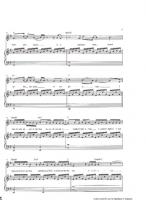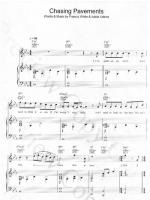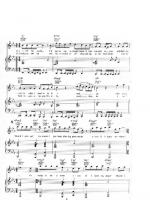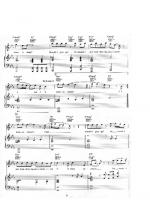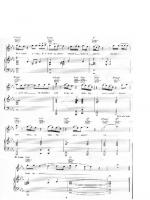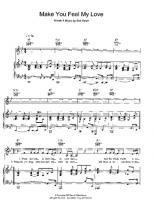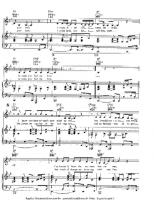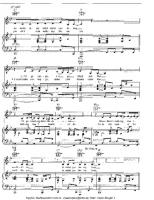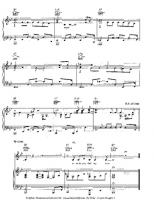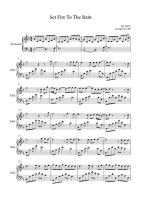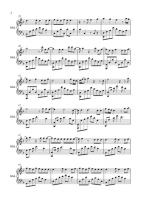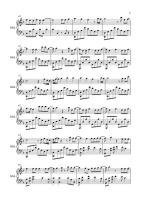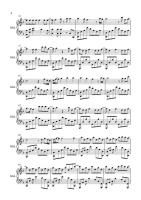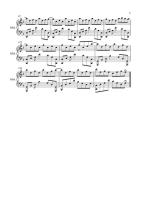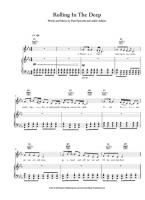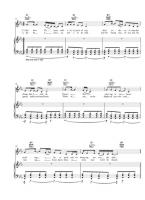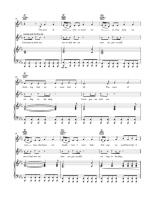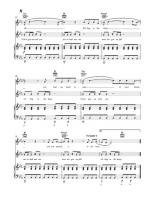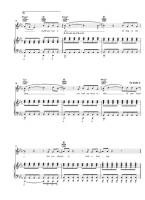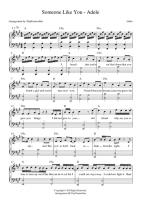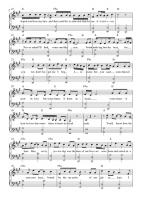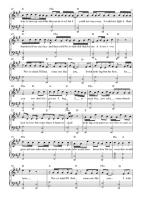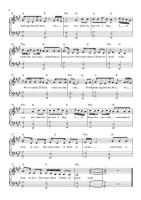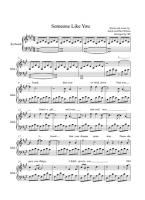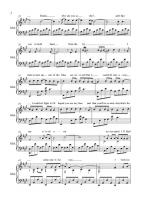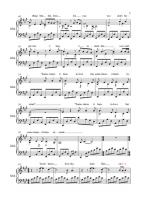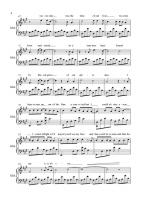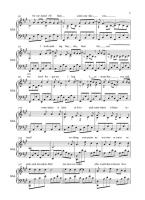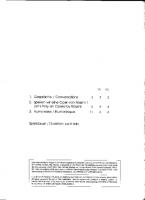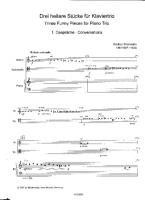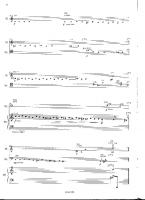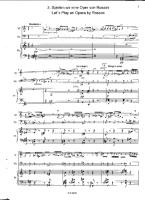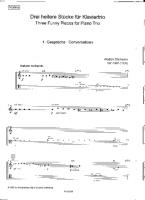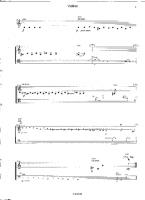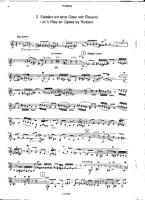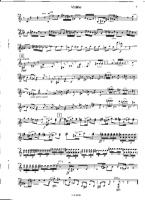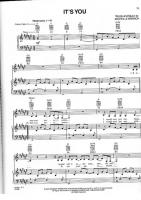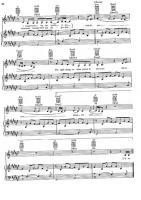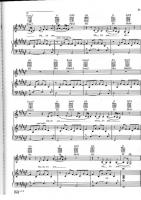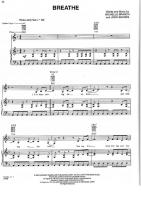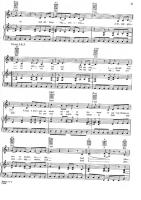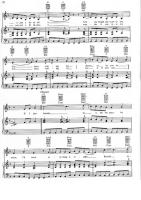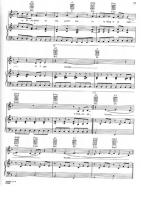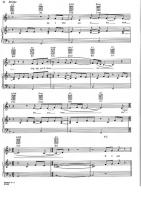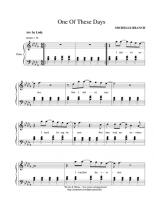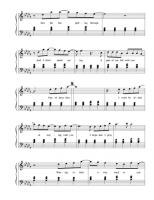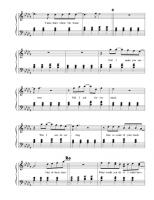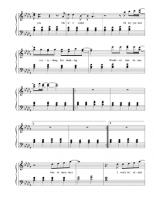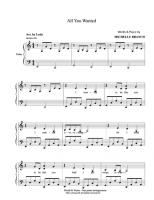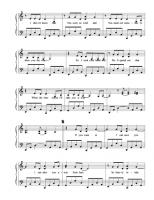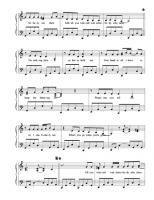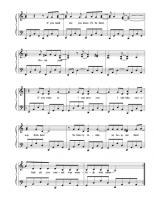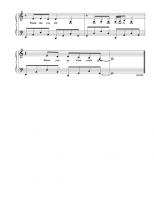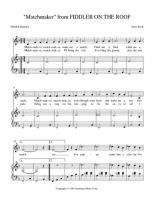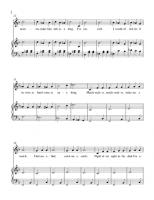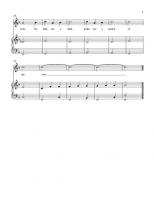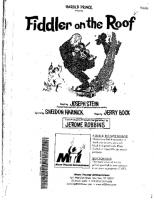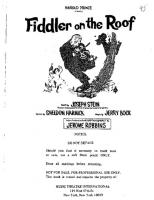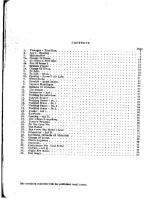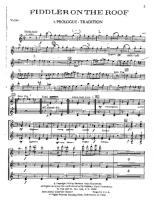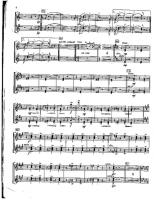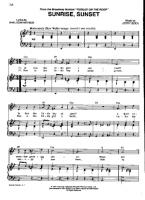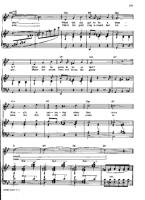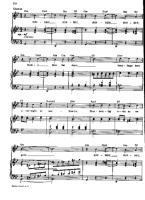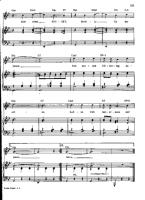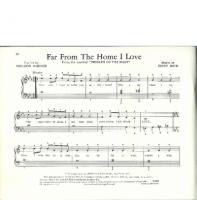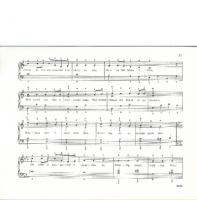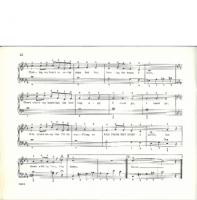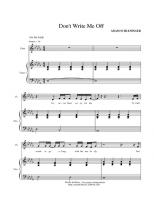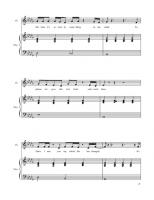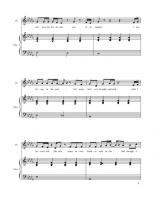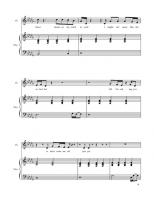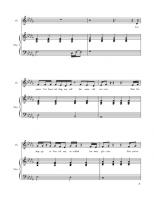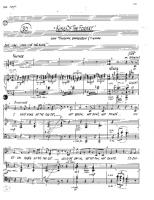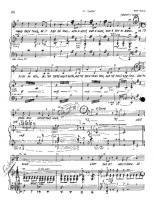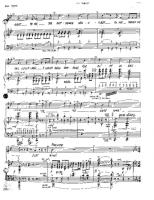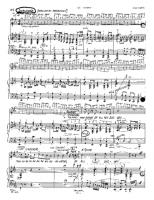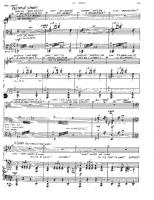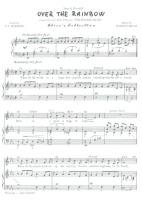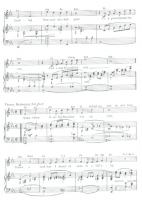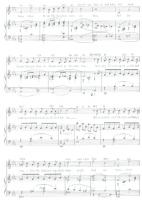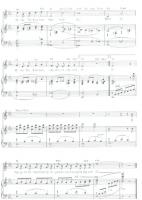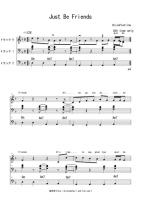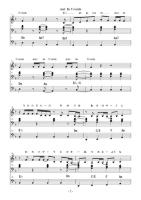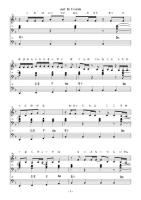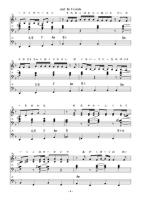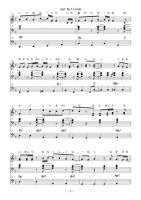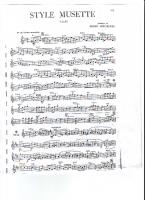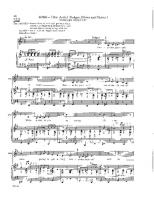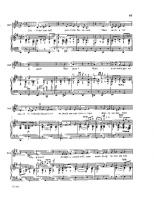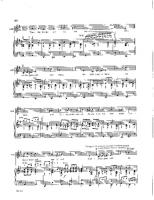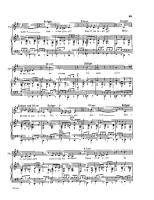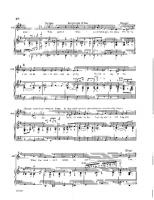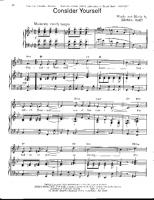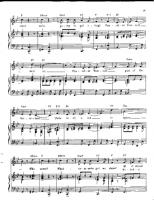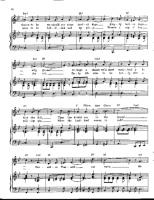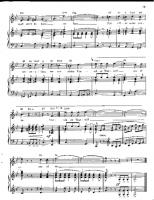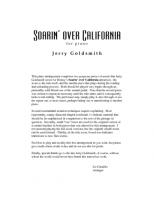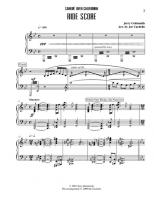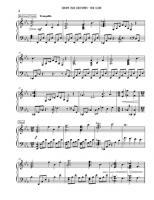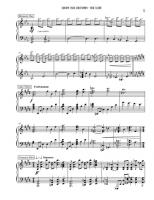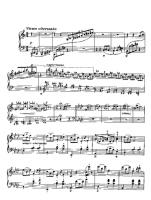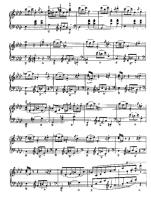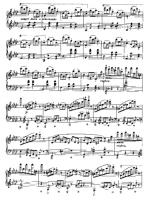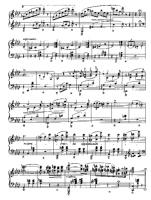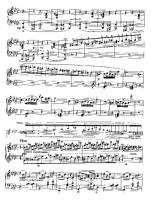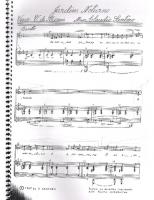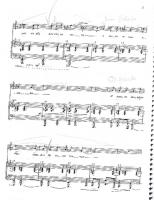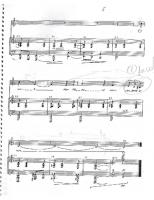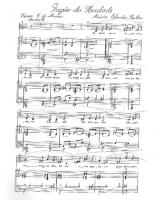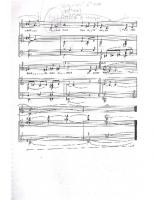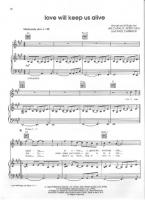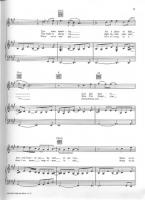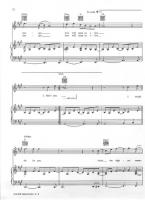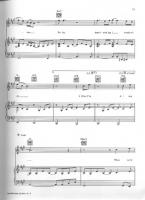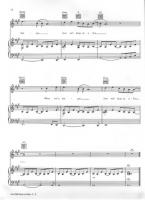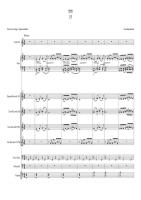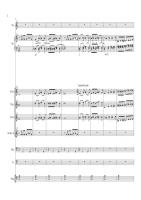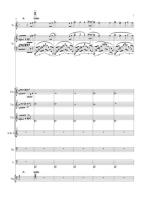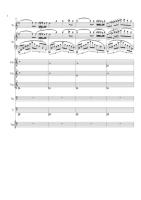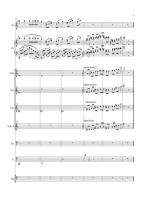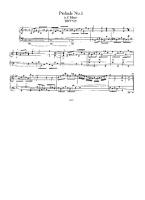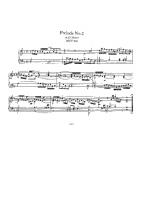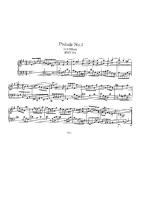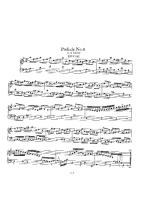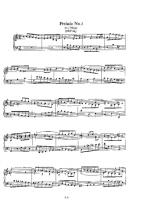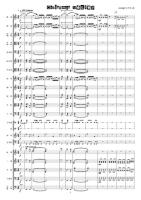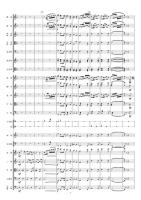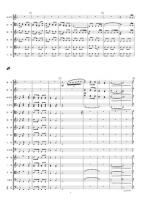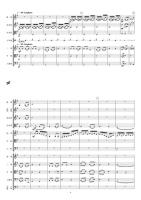Latest Sheets
Les Miserables
Les Misérables, colloquially known as Les Mis or Les Miz, is a musical composed in 1980 by the French composer Claude-Michel Schönberg with a libretto by Alain Boublil. Sung through, it is perhaps the most famous of all French musicals and one of the most performed musicals worldwide. On October 8, 2006, the show celebrated its 21st anniversary and became the longest-running West End musical in history and is still running (though it has changed venues).
Among the most famous songs of this Tony award-winning musical are "I Dreamed a Dream", "One Day More", "A Heart Full of Love", "Stars", "Bring Him Home", "Do You Hear the People Sing?", "Master of the House", and "On My Own."
The musical is based on the 1862 novel Les Misérables by Victor Hugo. Set in early 19th century France, it follows the intertwining stories of a cast of characters as they struggle for redemption and revolution. The characters include a paroled convict named Jean Valjean who, failing attempts to find work as an honest man with his yellow ticket of leave, breaks his parole and conceals his identity; the police inspector Javert who becomes obsessed with finding Valjean; Fantine, the single mother who is forced to become a prostitute to support her daughter; Cosette, who eventually falls in love with a French student named Marius Pontmercy. After Fantine dies, Cosette becomes Jean Valjean's adopted daughter; the Thénardiers, the unscrupulous innkeepers who thrive on cheating and stealing; Éponine, their young daughter who is hopelessly in love with Marius; Gavroche, a young beggar boy; and student leader Enjolras who plans the revolt to free the oppressed lower classes of France. The main characters are joined by an ensemble that includes prostitutes, student revolutionaries, factory workers, and others.
Among the most famous songs of this Tony award-winning musical are "I Dreamed a Dream", "One Day More", "A Heart Full of Love", "Stars", "Bring Him Home", "Do You Hear the People Sing?", "Master of the House", and "On My Own."
The musical is based on the 1862 novel Les Misérables by Victor Hugo. Set in early 19th century France, it follows the intertwining stories of a cast of characters as they struggle for redemption and revolution. The characters include a paroled convict named Jean Valjean who, failing attempts to find work as an honest man with his yellow ticket of leave, breaks his parole and conceals his identity; the police inspector Javert who becomes obsessed with finding Valjean; Fantine, the single mother who is forced to become a prostitute to support her daughter; Cosette, who eventually falls in love with a French student named Marius Pontmercy. After Fantine dies, Cosette becomes Jean Valjean's adopted daughter; the Thénardiers, the unscrupulous innkeepers who thrive on cheating and stealing; Éponine, their young daughter who is hopelessly in love with Marius; Gavroche, a young beggar boy; and student leader Enjolras who plans the revolt to free the oppressed lower classes of France. The main characters are joined by an ensemble that includes prostitutes, student revolutionaries, factory workers, and others.
Taylor Swift
Taylor Alison Swift (born December 13, 1989) is an American country-pop singer-songwriter. In 2006, she released her debut single "Tim McGraw", which peaked at number six on the Billboard country charts. Later in October 2006, she released her self-titled debut album, which produced five hit singles on the Billboard Hot Country Songs charts and was certified 3× Multi-Platinum by the RIAA. The New York Times described Swift as "one of pop's finest songwriters, country’s foremost pragmatist and more in touch with her inner life than most adults".
According to Nielsen SoundScan, Swift was the biggest selling artist of 2008 in America with combined sales of more than four million albums. Swift's Fearless and her self-titled album finished 2008 at number three and number six respectively, with sales of 2.1 and 1.5 million. She was the first artist in the history of Nielsen SoundScan to have two different albums in the Top 10 on the year end album chart. Fearless has topped the Billboard 200 in 11 non-consecutive weeks. No album has spent more time at number one since 1999-2000. It also was the first album by a female artist in country music history to log eight weeks at #1 on The Billboard 200. In mid-January 2009, Swift became the first country artist to top the 2 million mark in paid downloads with three different songs. As of the week ending February 8, 2009, Swift's single "Love Story" became the country song with most paid downloads in history and the first country song to top the Mainstream Top 40 chart. According to the 2009 issue of Forbes, Swift is ranked as the 69th most powerful celebrity with over $18 million dollars in earnings this year.
According to Nielsen SoundScan, Swift was the biggest selling artist of 2008 in America with combined sales of more than four million albums. Swift's Fearless and her self-titled album finished 2008 at number three and number six respectively, with sales of 2.1 and 1.5 million. She was the first artist in the history of Nielsen SoundScan to have two different albums in the Top 10 on the year end album chart. Fearless has topped the Billboard 200 in 11 non-consecutive weeks. No album has spent more time at number one since 1999-2000. It also was the first album by a female artist in country music history to log eight weeks at #1 on The Billboard 200. In mid-January 2009, Swift became the first country artist to top the 2 million mark in paid downloads with three different songs. As of the week ending February 8, 2009, Swift's single "Love Story" became the country song with most paid downloads in history and the first country song to top the Mainstream Top 40 chart. According to the 2009 issue of Forbes, Swift is ranked as the 69th most powerful celebrity with over $18 million dollars in earnings this year.
Finger eleven
Finger Eleven is a Canadian rock band from Burlington, Ontario, formed in 1989. They have currently released five studio albums, with their album The Greyest of Blue Skies bringing them into the mainstream. The 2003 self-titled album achieved Gold status in the United States and Platinum in Canada, largely from the success of the single "One Thing", which marked the band's first placing on the US Hot 100 Chart at number 16. Their 2007 album Them vs. You vs. Me launched the single "Paralyzer", which went on to top numerous charts including the Canadian Hot 100 and both US rock charts, as well as reaching #6 on the US Hot 100 and #12 on the Australian Singles Chart. They won the Juno Award for Rock Album of the Year in 2008.
Azimuth
Azimuth was a British jazz trio, active from 1977 to 2000. The ensemble was composed of trumpeter Kenny Wheeler, vocalist Norma Winstone and Winstone's husband, pianist John Taylor. Their first release under this name was a 1977 album issued on ECM Records; two further albums quickly followed, with later albums coming in 1985 and 1995.
Adele
Adele Laurie Blue Adkins (born 5 May 1988 in Enfield, North London), She is the first recipient of the Brit Awards Critics' Choice, which was given to artists who, at the time, had yet to release an album. She debuted at number one with her Mercury Prize nominated debut album 19 in the UK album chart and has since then been certified platinum with sales over 500,000 copies.
Shchedrin
Rodion Konstantinovich Shchedrin (Russian: Родио́н Константи́нович Щедри́н, Scientific transliteration: Rodion Konstantinovič Ščedrin, Russian pronunciation: ; born December 16, 1932) is a Russian composer. He was one оf the leading Soviet composers, and was the chairman of the Union of Russian Composers from 1973 until 1990.
Michelle Branch
Michelle Jacquet Branch-Landau (born July 2, 1983) is an American singer, songwriter and guitarist. She made her debut in 2000, and released the platinum-selling albums The Spirit Room and Hotel Paper in August 2001 and June 2003 respectively. During this period, she collaborated with Santana on the single "The Game of Love", which won a Grammy Award. In 2004, she formed the musical duo The Wreckers with fellow musician Jessica Harp. Michelle Branch will release her first solo album with Warner Bros. Nashville, Everything Comes and Goes, in February 2009.
Fiddler on the Roof
Fiddler on the Roof is a musical with music by Jerry Bock, lyrics by Sheldon Harnick, and book by Joseph Stein, set in csarist Russia in 1905.
Fiddler on the Roof was originally entitled Tevye. It is based on Tevye and his Daughters (or Tevye the Milkman) and other tales by Sholem Aleichem which he wrote in Yiddish and published in 1894. The story centers on Tevye, the father of five daughters, and his attempts to maintain his family and religious traditions while outside influences encroach upon their lives. He must cope with both the strong-willed actions of his three older daughters—each daughter's choice of husband moves progressively further away from established customs—and with the edict of the Tsar that evicts the Jews from their village.
The musical's title stems from a painting by Marc Chagall, one of many surreal paintings he created of Eastern European Jewish life, often including a fiddler. The Fiddler is a metaphor for survival, through tradition and joyfulness, in a life of uncertainty and imbalance.
The original Broadway production of the show, which opened in 1964, was the first musical to surpass the 3,000 performance mark, and it held the record for longest-running Broadway musical for almost 10 years until Grease surpassed its run. The production earned $1,574 for every dollar invested in it.
The show was highly acclaimed and nominated for ten Tony Awards, winning nine, including Best Musical, score, book, direction and choreography. It spawned four Broadway revivals, a successful 1971 film adaptation, and has enjoyed enduring international popularity. It is also a very popular choice for school and community productions.
Fiddler on the Roof was originally entitled Tevye. It is based on Tevye and his Daughters (or Tevye the Milkman) and other tales by Sholem Aleichem which he wrote in Yiddish and published in 1894. The story centers on Tevye, the father of five daughters, and his attempts to maintain his family and religious traditions while outside influences encroach upon their lives. He must cope with both the strong-willed actions of his three older daughters—each daughter's choice of husband moves progressively further away from established customs—and with the edict of the Tsar that evicts the Jews from their village.
The musical's title stems from a painting by Marc Chagall, one of many surreal paintings he created of Eastern European Jewish life, often including a fiddler. The Fiddler is a metaphor for survival, through tradition and joyfulness, in a life of uncertainty and imbalance.
The original Broadway production of the show, which opened in 1964, was the first musical to surpass the 3,000 performance mark, and it held the record for longest-running Broadway musical for almost 10 years until Grease surpassed its run. The production earned $1,574 for every dollar invested in it.
The show was highly acclaimed and nominated for ten Tony Awards, winning nine, including Best Musical, score, book, direction and choreography. It spawned four Broadway revivals, a successful 1971 film adaptation, and has enjoyed enduring international popularity. It is also a very popular choice for school and community productions.
Music and Lyrics
Music and Lyrics is a romantic comedy film released by Warner Bros. on February 14, 2007 in the United States, Canada, and Australia, and on February 9, 2007 in the United Kingdom. The film stars Hugh Grant as Alex Fletcher, a washed-up 1980s pop star and Drew Barrymore as Sophie Fisher, a former English literature major. It tells the story of their efforts to write a song for singer Cora Corman (Haley Bennett), and their subsequent romance.
The film received mixed reviews from contemporary critics, but topped the UK box office. At the North American box office, it debuted at number four and generated $19 million in its first week.
The film received mixed reviews from contemporary critics, but topped the UK box office. At the North American box office, it debuted at number four and generated $19 million in its first week.
Wizard of Oz
The Wizard of Oz
The Wizard of Oz is a 1939 American musical-fantasy film mainly directed by Victor Fleming and based on the 1900 children’s novel The Wonderful Wizard of Oz by L. Frank Baum. The film features Judy Garland as Dorothy Gale, Ray Bolger as the Scarecrow, Jack Haley as the Tin Man, Bert Lahr as the Cowardly Lion, Billie Burke as Glinda the Good Witch of the North, Margaret Hamilton as the Wicked Witch of the West, and Frank Morgan as the Wizard.
The film follows schoolgirl Dorothy Gale who lives on a Kansas farm with her Aunt Em and Uncle Henry, but dreams of a better place "somewhere over the rainbow." After being struck unconscious during a tornado by a piece of broken window, Dorothy dreams that she, her dog Toto, and the farmhouse are transported to the magical Land of Oz. There, the Good Witch of the North Glinda advises Dorothy to follow the yellow brick road to Emerald City and meet the Wizard of Oz, who can return her to Kansas. During her journey, she meets a Scarecrow, Tin Man and a Cowardly Lion, who join her, hoping to receive what they lack themselves (a brain, a heart, and courage, respectively), all of this is done while also trying to avoid the many plots of the Wicked Witch of the West, in her attempt to get the ruby slippers that Dorothy received from the squashed Wicked Witch of the East.
The Wizard of Oz is widely noted for its musical selections and soundtrack. The songs from The Wizard of Oz became widely popular, with "Over the Rainbow" receiving the Academy Award for Best Original Song, and the film itself garnering several Academy Award nominations, including Best Picture.
The film follows schoolgirl Dorothy Gale who lives on a Kansas farm with her Aunt Em and Uncle Henry, but dreams of a better place "somewhere over the rainbow." After being struck unconscious during a tornado by a piece of broken window, Dorothy dreams that she, her dog Toto, and the farmhouse are transported to the magical Land of Oz. There, the Good Witch of the North Glinda advises Dorothy to follow the yellow brick road to Emerald City and meet the Wizard of Oz, who can return her to Kansas. During her journey, she meets a Scarecrow, Tin Man and a Cowardly Lion, who join her, hoping to receive what they lack themselves (a brain, a heart, and courage, respectively), all of this is done while also trying to avoid the many plots of the Wicked Witch of the West, in her attempt to get the ruby slippers that Dorothy received from the squashed Wicked Witch of the East.
The Wizard of Oz is widely noted for its musical selections and soundtrack. The songs from The Wizard of Oz became widely popular, with "Over the Rainbow" receiving the Academy Award for Best Original Song, and the film itself garnering several Academy Award nominations, including Best Picture.
Dixie Flatline
Dixie Flatline (ジェミニの人, Gemini no Hito) is skillful in composing relaxing electronica ballads, hip-hop, and R&B. He is the author of the hit song "Gemini," his first work. His popularity has remained stable since then; his songs "Sweetie x 2", "Juvenile", and "Just Be Friends" have all gained considerable popularity.
Andre Verchuren
André Verchuren is a french accordion player born on 28th December 1920 at Neuilly-sous-Clermont in the county of Oise in France. His family is from Belgium.
He started to play at four years old and followed his dad’s lessons, Raymond Verchuren, professional musician. He headlined his first gig at the age of six, accompanied by his mother on the drums, and at the age of twelve, recieved the accordion world cup from the Belgian king Léopold de Belgique and finished studying in his father’s accordion school.
He participated in more than 10 000 galas representing around 40 million spectators. His album sales come to over 70 million. He is the world record holder in selling accordion music. He is commander of the Order of National Merit for his professionnal carreer (72 years in business).
He started to play at four years old and followed his dad’s lessons, Raymond Verchuren, professional musician. He headlined his first gig at the age of six, accompanied by his mother on the drums, and at the age of twelve, recieved the accordion world cup from the Belgian king Léopold de Belgique and finished studying in his father’s accordion school.
He participated in more than 10 000 galas representing around 40 million spectators. His album sales come to over 70 million. He is the world record holder in selling accordion music. He is commander of the Order of National Merit for his professionnal carreer (72 years in business).
Oliver!
Oliver! is a British musical, with music and lyrics by Lionel Bart. It first appeared in the West End in 1960, enjoying a long run, and was made into a film directed by Carol Reed in 1968.
The musical is loosely based upon the novel Oliver Twist by Charles Dickens. That it was the first musical adaptation of a Charles Dickens work to become a stage hit was one of the reasons why it attracted such attention. There had been two previous Dickens musicals in the 1950s, both of them television adaptations of A Christmas Carol, but the dramatic story of Oliver Twist was the first Dickens work to be presented as a successful stage musical. Another reason for the success of the musical was the revolving stage set, an innovation designed by Sean Kenny.
The show launched the careers of several child actors, including Davy Jones, later of The Monkees; Phil Collins, later of Genesis; and Tony Robinson, who later played the role of Baldrick in the television series Black Adder. The singer Steve Marriott (Small Faces, Humble Pie) also featured in early line-ups, eventually graduating to the role of Artful Dodger in the West End production.
The plot of Dickens's original novel is considerably simplified for the purposes of the musical, with Fagin being represented more as a comic character than as a villain, and large portions of the latter part of the story being completely left out. Although Dickens' novel has been called antisemitic in its portrayal of the Jew Fagin as evil, the production by Bart (himself a Jew) featured many Jewish actors in leading roles: Ron Moody (Ronald Moodnik), Georgia Brown (Lilian Klot), and Martin Horsey.
The musical is loosely based upon the novel Oliver Twist by Charles Dickens. That it was the first musical adaptation of a Charles Dickens work to become a stage hit was one of the reasons why it attracted such attention. There had been two previous Dickens musicals in the 1950s, both of them television adaptations of A Christmas Carol, but the dramatic story of Oliver Twist was the first Dickens work to be presented as a successful stage musical. Another reason for the success of the musical was the revolving stage set, an innovation designed by Sean Kenny.
The show launched the careers of several child actors, including Davy Jones, later of The Monkees; Phil Collins, later of Genesis; and Tony Robinson, who later played the role of Baldrick in the television series Black Adder. The singer Steve Marriott (Small Faces, Humble Pie) also featured in early line-ups, eventually graduating to the role of Artful Dodger in the West End production.
The plot of Dickens's original novel is considerably simplified for the purposes of the musical, with Fagin being represented more as a comic character than as a villain, and large portions of the latter part of the story being completely left out. Although Dickens' novel has been called antisemitic in its portrayal of the Jew Fagin as evil, the production by Bart (himself a Jew) featured many Jewish actors in leading roles: Ron Moody (Ronald Moodnik), Georgia Brown (Lilian Klot), and Martin Horsey.
Lionel Bart
Lionel Bart (1 August 1930 – 3 April 1999) was a writer and composer of British pop music and musicals, best known for creating the book, music and lyrics for Oliver!
He started his songwriting career in amateur theatre, first at The International Youth Centre in 1952 where he and a friend wrote a revue together called IYC Revue 52. The following year the pair auditioned for a production of the Leonard Irwin play The Wages Of Eve at Unity Theatre, London. Shortly after Bart began composing songs for Unity Theatre, contributing material (including the title song) to their 1953 revue Turn It Up, and songs for their 1953 pantomime, an agit prop version of Cinderella. While at Unity he was talent spotted by Joan Littlewood and so joined Theatre Workshop. He also wrote comedy songs for the Sunday lunchtime BBC radio programme The Billy Cotton Band Show.
He first gained widespread recognition through his pop songwriting, penning numerous hits for the stable of young male singers promoted by artist manager and music publisher Larry Parnes. Bart's pop output in this period includes the hits "Living Doll" (written for Cliff Richard) and "Rock with the Cavemen","Handful of Songs", "Butterfingers" and "Little White Bull" (for Tommy Steele). During this period, Mike Pratt as well as Steele were his songwriting partners. In 1957, he won three Ivor Novello Awards, a further four in 1958, and two in 1960. He wrote the theme song for the 1963 James Bond film From Russia with Love. His other hits include: "Do You Mind?" (recorded by both Anthony Newley and Andy Williams), "Big Time" (a 1961 cover of his "Fings Ain't Wot They Used T'Be" show tune by Jack Jones), "Easy Going Me" (Adam Faith) and "Always You And Me" (with Russ Conway).
Bart was also responsible for the discovery of two of Parnes' biggest stars. It was on his recommendation that Parnes went to see singer Tommy Hicks, whom he signed and renamed Tommy Steele, and Bart also suggested that Parnes see singer Reg Smith, who was then performing at the Condor Club. Although Parnes missed his performance, he went round to Smith's house and signed him up on the basis of Bart's recommendation. Smith went on to score a number of UK hits under his new stage name Marty Wilde.
He started his songwriting career in amateur theatre, first at The International Youth Centre in 1952 where he and a friend wrote a revue together called IYC Revue 52. The following year the pair auditioned for a production of the Leonard Irwin play The Wages Of Eve at Unity Theatre, London. Shortly after Bart began composing songs for Unity Theatre, contributing material (including the title song) to their 1953 revue Turn It Up, and songs for their 1953 pantomime, an agit prop version of Cinderella. While at Unity he was talent spotted by Joan Littlewood and so joined Theatre Workshop. He also wrote comedy songs for the Sunday lunchtime BBC radio programme The Billy Cotton Band Show.
He first gained widespread recognition through his pop songwriting, penning numerous hits for the stable of young male singers promoted by artist manager and music publisher Larry Parnes. Bart's pop output in this period includes the hits "Living Doll" (written for Cliff Richard) and "Rock with the Cavemen","Handful of Songs", "Butterfingers" and "Little White Bull" (for Tommy Steele). During this period, Mike Pratt as well as Steele were his songwriting partners. In 1957, he won three Ivor Novello Awards, a further four in 1958, and two in 1960. He wrote the theme song for the 1963 James Bond film From Russia with Love. His other hits include: "Do You Mind?" (recorded by both Anthony Newley and Andy Williams), "Big Time" (a 1961 cover of his "Fings Ain't Wot They Used T'Be" show tune by Jack Jones), "Easy Going Me" (Adam Faith) and "Always You And Me" (with Russ Conway).
Bart was also responsible for the discovery of two of Parnes' biggest stars. It was on his recommendation that Parnes went to see singer Tommy Hicks, whom he signed and renamed Tommy Steele, and Bart also suggested that Parnes see singer Reg Smith, who was then performing at the Condor Club. Although Parnes missed his performance, he went round to Smith's house and signed him up on the basis of Bart's recommendation. Smith went on to score a number of UK hits under his new stage name Marty Wilde.
Jerry Goldsmith
Jerrald King "Jerry" Goldsmith (February 10, 1929 – July 21, 2004) was an American composer and conductor most known for his work in film and television scoring.
He composed scores for such noteworthy films as The Sand Pebbles, Planet of the Apes, Patton, Chinatown, The Wind and the Lion, The Omen, The Boys from Brazil, Alien, Poltergeist, Gremlins, Hoosiers, Total Recall, Basic Instinct, Rudy, Air Force One, L.A. Confidential, Mulan, The Mummy, three Rambo films, and five Star Trek films. He was nominated for six Grammy Awards, nine Golden Globes, four BAFTAs, and seventeen Academy Awards. In 1977 he was awarded an Oscar for The Omen.
He collaborated with some of the most prolific directors in film history, including Robert Wise (The Sand Pebbles, Star Trek: The Motion Picture), Howard Hawks (Rio Lobo), Otto Preminger (In Harm's Way), Joe Dante (Gremlins, The 'Burbs, Small Soldiers), Roman Polanski (Chinatown), Ridley Scott (Alien, Legend), Steven Spielberg (Poltergeist, Twilight Zone: The Movie), and Paul Verhoeven (Total Recall, Basic Instinct). However, his most notable collaboration was arguably that with Franklin J. Schaffner, for whom Goldsmith scored such films as Planet of the Apes, Patton, Papillon, and The Boys from Brazil.
He composed scores for such noteworthy films as The Sand Pebbles, Planet of the Apes, Patton, Chinatown, The Wind and the Lion, The Omen, The Boys from Brazil, Alien, Poltergeist, Gremlins, Hoosiers, Total Recall, Basic Instinct, Rudy, Air Force One, L.A. Confidential, Mulan, The Mummy, three Rambo films, and five Star Trek films. He was nominated for six Grammy Awards, nine Golden Globes, four BAFTAs, and seventeen Academy Awards. In 1977 he was awarded an Oscar for The Omen.
He collaborated with some of the most prolific directors in film history, including Robert Wise (The Sand Pebbles, Star Trek: The Motion Picture), Howard Hawks (Rio Lobo), Otto Preminger (In Harm's Way), Joe Dante (Gremlins, The 'Burbs, Small Soldiers), Roman Polanski (Chinatown), Ridley Scott (Alien, Legend), Steven Spielberg (Poltergeist, Twilight Zone: The Movie), and Paul Verhoeven (Total Recall, Basic Instinct). However, his most notable collaboration was arguably that with Franklin J. Schaffner, for whom Goldsmith scored such films as Planet of the Apes, Patton, Papillon, and The Boys from Brazil.
Within Temptation
Within Temptation is a Dutch rock/metal band. The band was founded in 1996 by vocalist Sharon den Adel and guitarist Robert Westerholt. Their music is described as symphonic metal, gothic metal, although in an interview, Den Adel said they fell into a symphonic rock genre with various influences, and in a later interview with 3VOOR12, Sharon stated that "we consider ourselves more a symphonic rock band ... we are in my opinion no gothic band".
After the release of their first album Enter, the band became prominent in the underground scene. However it was not until 2001 that they became known to the general public, with the single "Ice Queen" from the album Mother Earth, which reached #2 on the charts. Since then, the band won the Conamus Exportprijs five years in a row. Their next album The Silent Force debuted at #1 on the Dutch charts, as did their latest, The Heart of Everything. In 2008 they released a live DVD and CD, Black Symphony, recorded with the Metropole Orchestra.
On August 11, 2009 Within Temptation announced that they would be releasing a live album consisting of acoustic sets from their theatre tour, entitled An Acoustic Night At The Theatre, which was released on October 30th.
After the release of their first album Enter, the band became prominent in the underground scene. However it was not until 2001 that they became known to the general public, with the single "Ice Queen" from the album Mother Earth, which reached #2 on the charts. Since then, the band won the Conamus Exportprijs five years in a row. Their next album The Silent Force debuted at #1 on the Dutch charts, as did their latest, The Heart of Everything. In 2008 they released a live DVD and CD, Black Symphony, recorded with the Metropole Orchestra.
On August 11, 2009 Within Temptation announced that they would be releasing a live album consisting of acoustic sets from their theatre tour, entitled An Acoustic Night At The Theatre, which was released on October 30th.
Franz Liszt
Franz Liszt (Hungarian: Ferencz Liszt, in modern usage Ferenc Liszt, from 1859 to 1865 officially Franz Ritter von Liszt) (October 22, 1811 – July 31, 1886) was a Hungarian composer, virtuoso pianist and teacher. He was also the father-in-law of Richard Wagner. In 1865 he became abbot in the Roman Catholic Church.
Liszt became renowned throughout Europe during the 19th century for his great skill as a performer. He was said by his contemporaries to have been the most technically advanced pianist of his age and perhaps the greatest pianist of all time. He was also an important and influential composer, a notable piano teacher, a conductor who contributed significantly to the modern development of the art, and a benefactor to other composers and performers, notably Richard Wagner, Hector Berlioz, Camille Saint-Saëns, Edvard Grieg and Alexander Borodin.
As a composer, Liszt was one of the most prominent representatives of the "Neudeutsche Schule" ("New German School"). He left behind a huge and diverse body of work, in which he influenced his forward-looking contemporaries and anticipated some 20th-century ideas and trends. Some of his most notable contributions were the invention of the symphonic poem, developing the concept of thematic transformation as part of his experiments in musical form and making radical departures in harmony.
Liszt became renowned throughout Europe during the 19th century for his great skill as a performer. He was said by his contemporaries to have been the most technically advanced pianist of his age and perhaps the greatest pianist of all time. He was also an important and influential composer, a notable piano teacher, a conductor who contributed significantly to the modern development of the art, and a benefactor to other composers and performers, notably Richard Wagner, Hector Berlioz, Camille Saint-Saëns, Edvard Grieg and Alexander Borodin.
As a composer, Liszt was one of the most prominent representatives of the "Neudeutsche Schule" ("New German School"). He left behind a huge and diverse body of work, in which he influenced his forward-looking contemporaries and anticipated some 20th-century ideas and trends. Some of his most notable contributions were the invention of the symphonic poem, developing the concept of thematic transformation as part of his experiments in musical form and making radical departures in harmony.
Claudio Santoro
Cláudio Franco de Sá Santoro (Manaus, 23 November 1919–Brasília, 27 March 1989) was an internationally renowned Brazilian composer and violinist.
Eagles
The Eagles are an American rock band that was formed in Los Angeles, California during the early 1970s. With five Number 1 singles and six Number 1 albums, the Eagles were one of the most successful recording artists of the decade. At the end of the 20th century, two of their albums, Eagles: Their Greatest Hits 1971–1975 and Hotel California, ranked among the ten best-selling albums according to the Recording Industry Association of America. The best-selling studio album Hotel California is rated as the thirty-seventh album in the Rolling Stone list "The 500 Greatest Albums of All Time", and the band was ranked number 75 on Rolling Stone's 2004 list of the 100 Greatest Artists of All Time. They are also the best-selling American group ever, with Eagles: Their Greatest Hits 1971–1975 being the best-selling album in the U.S. to date.
The Eagles broke up in 1980, but reunited in 1994 for Hell Freezes Over, a mix of live and new studio tracks. They have toured intermittently since then, and were inducted into the Rock and Roll Hall of Fame in 1998.
In 2007, the Eagles released Long Road out of Eden, their first full studio album in 28 years.
Members:
Glenn Frey
Don Henley
Joe Walsh
Timothy B. Schmit
The Eagles broke up in 1980, but reunited in 1994 for Hell Freezes Over, a mix of live and new studio tracks. They have toured intermittently since then, and were inducted into the Rock and Roll Hall of Fame in 1998.
In 2007, the Eagles released Long Road out of Eden, their first full studio album in 28 years.
Members:
Glenn Frey
Don Henley
Joe Walsh
Timothy B. Schmit
Aram Khachaturian
Aram Ilyich Khachaturian (Armenian: Արամ Խաչատրյան; Russian: Ара́м Ильи́ч Хачатуря́н; June 6 1903 – May 1, 1978) was a prominent Soviet Armenian composer. Khachaturian's works were often influenced by classical Russian music and Armenian folk music. He is most famous for the Adagio of Spartacus and Phrygia from his ballet Spartacus, and for the "Sabre Dance" from his ballet Gayane and the adagio from the same ballet, much used in films since its first use in Stanley Kubrick's 2001: A Space Odyssey.
Bach
Johann Sebastian Bach (31 March 1685 – 28 July 1750) was a German composer and organist whose sacred and secular works for choir, orchestra, and solo instruments drew together the strands of the Baroque period and brought it to its ultimate maturity. Although he introduced no new forms, he enriched the prevailing German style with a robust contrapuntal technique, an unrivalled control of harmonic and motivic organisation in composition for diverse musical forces, and the adaptation of rhythms and textures from abroad, particularly Italy and France.
Revered for their intellectual depth and technical and artistic beauty, Bach's works include the Brandenburg concertos; the Goldberg Variations; the English Suites, French Suites, Partitas, and Well-Tempered Clavier; the Mass in B Minor; the St. Matthew Passion; the St. John Passion; The Musical Offering; The Art of Fugue; the Sonatas and Partitas for violin solo; the Cello Suites; more than 200 surviving cantatas; and a similar number of organ works, including the celebrated Toccata and Fugue in D Minor.
While Bach's fame as an organist was great during his lifetime, he was not particularly well-known as a composer. His adherence to Baroque forms and contrapuntal style was considered "old-fashioned" by his contemporaries, especially late in his career when the musical fashion tended towards Rococo and later Classical styles. A revival of interest and performances of his music began early in the 19th century, and he is now widely considered to be one of the greatest composers in the Western tradition.
Revered for their intellectual depth and technical and artistic beauty, Bach's works include the Brandenburg concertos; the Goldberg Variations; the English Suites, French Suites, Partitas, and Well-Tempered Clavier; the Mass in B Minor; the St. Matthew Passion; the St. John Passion; The Musical Offering; The Art of Fugue; the Sonatas and Partitas for violin solo; the Cello Suites; more than 200 surviving cantatas; and a similar number of organ works, including the celebrated Toccata and Fugue in D Minor.
While Bach's fame as an organist was great during his lifetime, he was not particularly well-known as a composer. His adherence to Baroque forms and contrapuntal style was considered "old-fashioned" by his contemporaries, especially late in his career when the musical fashion tended towards Rococo and later Classical styles. A revival of interest and performances of his music began early in the 19th century, and he is now widely considered to be one of the greatest composers in the Western tradition.
Various Artists
Search for Free Sheet Music
You can make a search through the entire collection of sheets.
You can make a search through the entire collection of sheets.
Hi, fellow musicians!
There is no registration required to download the sheets but you can subscribe to our mailing list to get notified of new sheets.
There is no registration required to download the sheets but you can subscribe to our mailing list to get notified of new sheets.
Latest Artists
Rumbling Hearts
× 1
Ernesto Nazareth × 2
Carriere, F × 1
Charles Lipinski × 1
The Police × 1
Jason Robert Brown × 2
Ottorino Respighi × 1
Saint Saens × 1
Thomas Elgar Sugar × 1
Henryk Wieniawski × 1
Bobby Timmons × 1
Pachelbel × 3
Cécile Louise Stéphanie C... × 1
Clint Mansell × 1
Caitie Searcy × 1
Thomas Lupo × 1
Rent (Musical) × 1
Clara Schumann × 1
Philip Wesley × 1
Enrique Iglesias × 1
Frank Halferty × 1
M. Francisco, SJ × 1
Alex Fong × 1
Ty Kroll × 1
William M. Golden × 1
Danny Elfman × 1
Led Zeppelin × 1
Jonathan Larson × 1
Bond Quartet × 1
George F. Root × 1
Adele × 5
Michael Nyman × 1
Simon Phillips × 1
J. S. Bach × 7
George L. Cobb × 1
Lenny Kravitz × 1
John Coltrane × 1
Jan Akkerman × 1
José Galvão × 2
William Bradbury × 1
No Doubt × 1
Bukas Palad × 1
The Kingston Trio × 1
Augusta Mary Wakefield × 1
Mehmet Ilgın × 1
Brahms × 5
Depeche Mode × 1
WA Mozart × 1
Joe Cocker × 1
Gundam Seed Destiny × 1
Ernesto Nazareth × 2
Carriere, F × 1
Charles Lipinski × 1
The Police × 1
Jason Robert Brown × 2
Ottorino Respighi × 1
Saint Saens × 1
Thomas Elgar Sugar × 1
Henryk Wieniawski × 1
Bobby Timmons × 1
Pachelbel × 3
Cécile Louise Stéphanie C... × 1
Clint Mansell × 1
Caitie Searcy × 1
Thomas Lupo × 1
Rent (Musical) × 1
Clara Schumann × 1
Philip Wesley × 1
Enrique Iglesias × 1
Frank Halferty × 1
M. Francisco, SJ × 1
Alex Fong × 1
Ty Kroll × 1
William M. Golden × 1
Danny Elfman × 1
Led Zeppelin × 1
Jonathan Larson × 1
Bond Quartet × 1
George F. Root × 1
Adele × 5
Michael Nyman × 1
Simon Phillips × 1
J. S. Bach × 7
George L. Cobb × 1
Lenny Kravitz × 1
John Coltrane × 1
Jan Akkerman × 1
José Galvão × 2
William Bradbury × 1
No Doubt × 1
Bukas Palad × 1
The Kingston Trio × 1
Augusta Mary Wakefield × 1
Mehmet Ilgın × 1
Brahms × 5
Depeche Mode × 1
WA Mozart × 1
Joe Cocker × 1
Gundam Seed Destiny × 1

